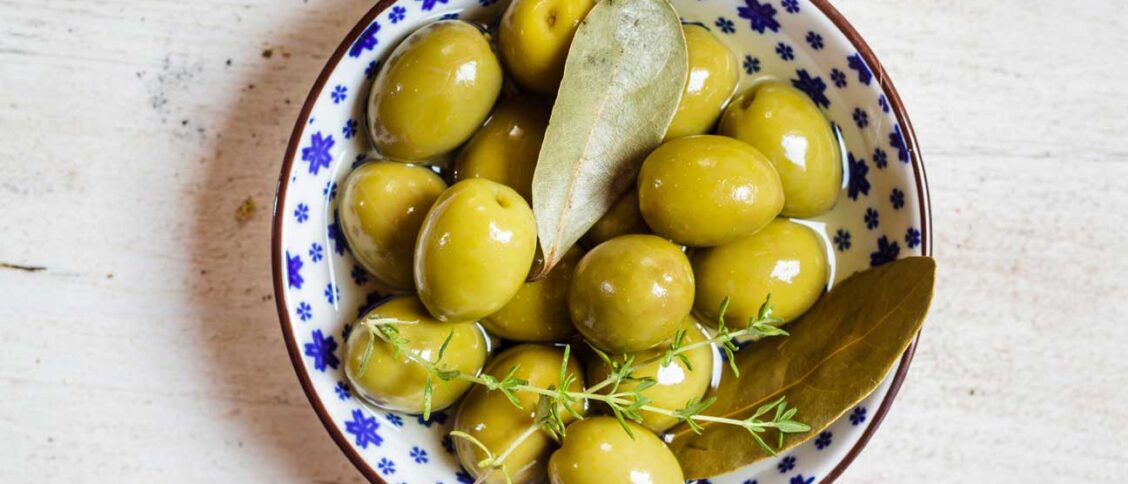What is Olives? Introduction
In this article we will discuss about 11 health benefits and side effects of olives. Olive (Olea europaea) is a tree with edible fruit, leaves, and seeds. The fruit and leaves are sometimes used as medicine. They belong to a category of fruits called drupes also known as stone fruits. They are closely related to mangoes, peaches, cherries as well as almonds and pistachios.Olives are a great source of vitamin E as well as other potent antioxidants. Studies have shown that they’re good for the heart and could aid in preventing osteoporosis as well as cancer.
The healthy fats contained in olives are extracted in order to create olive oil. It is one of the most important ingredients of the nutritious Mediterranean diet.In the Mediterranean region, about 90 percent of olives are utilised to produce olive oil. Olive oil can also be utilised to help prevent heart attack or stroke (cardiovascular disease) as well as breast cancer, colorectal cancer, arthritis rheumatoid and migraine headache. Don’t confuse olive with olive oil, the oil from olive fruit.
Olives Nutrition facts
Olives have 115-145 calories per 3.5 grams (100 grams) which is about the same as 59 calories for 10 olives.
The nutrition information for 3.5 grams (100 grams) of ripe canned olives.
| Calories | 116 |
| Protein | 0.8 grams |
| Carbs | 6 grams |
| Sugar | 0 grams |
| Fiber | 1.6 grams |
| Fat | 10.9 grams |
| Saturated | 2.3 grams |
| Monounsaturated | 7.7 grams |
| Polyunsaturated | 0.6 grams |
| Vitamins and minerals | Rich in vitamins and minerals |
| Carbs and fiber | 4–6% |
Most Popular Types of Olives
These are different types of olives
1. Kalamata
These olives brine-cured, blackish-green, are sour and have a lingering taste. Originating from Greece They’re an essential ingredient for cooking. You can use them in recipes such as pasta tosses, salads stews.
2. Thassos
Another one originated from Greece, these wrinkled, salt-cured black olives have an almost woodsy, mellow taste. Serve them with drizzles of olive oil and sprinkled with fresh or dried oregano.
3. Arbequina
The slightly bitter, brine-cured olives originate from Spain. Their colors are more vibrant than the typical olive green actually, one may discover them with hues ranging between burnt orange and pinkish brown which makes them an eye-catching option to add to your mix of appetizer olives.
4. Nyons
Olive experts love these soft slightly bitter slightly wrinkled olives which are cultivated within and surrounding the town in Nyons, France. Although they are difficult to locate, and can be expensive, their tender, juicy flesh and sweet, lightly fruity taste are worth the effort.
5. Nicoise
Though the French black olives may be tiny to size, they’re huge in flavour. Juicy, but not oily, these South-of-France olives are a popular choice in the Provencal kitchen. Try these with Salad Nicoise or in Pissaladiere, the well-known onion-olive tart that is typical of the region.
6. Picholine
It’s a French jewel is ideal olive-green olive! It’s brine-cured, meaty and savoury and has a mild citrusy taste and a crisp crunch. Try them in a olive tapenade recipe, which calls for a blend of black and green olives.
7. Cerignola
Once you’ve tasted these huge olives that have been cured in green brine Italian olives, you’ll be reminded that olives are actually fruits! Their delicate apple and lemon flavour is a perfect contrast to the more sour black and green olives in your plate.
11 health benefits and side effects of olives
First we will discuss about 11 health benefits of olives.
Health benefits of Olives
olives are tiny oval-shaped fruits that have an inedible, hard stone. They are grown primarily throughout the Mediterranean however, they are also grown in California. They are available in different shades of black and green depending on the time they are picked. Green being ripe, and black fully mature. Olives are tasty salted, delicious, and enjoyable to take in. However, did you know of their numerous health benefits.
1. Olives are rich source of antioxidants
Olives are high in plant substances known as polyphenols which possess powerful antioxidant properties. The positive effects of these substances include reducing the risk of developing chronic illnesses like atherosclerosis and cancer.
2. Olives are use as a anti-inflammatory medication
A poly phenol found in olives is known as oleocanthal. It is believed that this compound has the same pharmacological properties as ibuprofen and functions as an naturally anti-inflammatory. It is interesting to note that this beneficial property has been linked to positive outcomes in people suffering from rheumatoid arthritis.
3. Olives Helps to maintain heart health
While high in fat but the majority of them are an advantageous mono-unsaturated type known as Oleic acid. The fatty acid is linked with a lower risk of developing heart diseases. Oleic acid can assist in this regard by controlling the balance of cholesterol and reduce the blood pressure.
4. Olives helps improve bone health
Animal research have shown that the plant-based compounds found in olives can help in preventing bone loss, but these findings appear to support in the human population, there is still a lot to be learned. However, those who adhere to the Mediterranean eating plan are believed to have lower rates of fractures.
5. Olives are one of Nature’s Smart Drugs
Polyphenols are an organic chemical that helps reduce oxidative stress in the brain. A study conducted in 2013 on mice revealed that the supplementation of olive polyphenols increases amounts of substances (known as neurotrophins) nerve growth factor (NGF) and brain-derived neurotrophic factors (BDNF). Both are crucial to the development, growth, and life-span of brain cells.
6. Olives Help to Control Appetite
If you eat a handful of olives prior to eating it can reduce the stress of your appetite. This is due to the monounsaturated fatty acids found in healthy olives can slow down the digestion process and trigger the hormone cholecystokin which communicates feelings of contentment and satisfaction for the brain.
7. Olives have increasing amount of healthy microbes
Olives are among the most sought-after fermented food items. By consuming these food items you’re increasing the amount of healthy microbes along with enzymes and digestive enzymes which improves the microbiome health in your gut as well as digestive system, and could boost the immune system function.
8. Olives are Low in Calories
An olive is only 7 calories. They have a negative energy load’ meaning that you are burning more calories digesting an olive than you do by eating one. This means eating olives is a healthy and nutritious snack
9. Olives have Anti Cancer Properties
Chronic oxidative stress as well as chronic inflammation are key elements in the growth of cancer. And if our cells are overwhelmed by these factors, the risk of developing cancer in cells is elevated.
In providing us with ample antioxidants and Anti-inflammatory ingredients, olives aid us in avoiding this potentially dangerous combo of constant oxidative stress as well as chronic inflammation.
10. Some Olives Are Probiotic Rich
Certain olives are produced through the natural process of fermentation of lactic acid, which results in a live-culture product which is full of good-guy bacteria, known as probiotics. The probiotic rich foods are the best foods for gut health and are recommended by top doctors, scientists and nutritionists to be a component of any diet that promotes gut health.
11. Olives are great for the eyes.
It is reported that a cup of olives green contains 10 percent from the recommended daily amount of vitamin A. It converts into retinal forms that is vital to maintain healthy eyes. In essence, this vitamin allows your eyes to distinguish between dark and light and improves night vision.
Side effects of olives
Olive fruit is commonly eaten for food. There isn’t enough solid data to determine whether it’s appropriate to consume the fruits in larger quantities for medicinal purposes. Olive leaf extract could be safe if used in the right way. Everyone is aware that there’s both a good and a bad component to every ingredient.
1. Olives and olive oil Causes Acne
The excessive use of olive oil and olives may cause harm to your skin and increase the likelihood of getting acne. Olive oil is very heavy. It doesn’t absorb quickly into the skin and forms an incredibly thick layer of skin, which clogs the pores. Olive is rich in Vitamin E and antioxidants and healthy fats which can help moisturise, protect and help your skin appear healthier and younger. However, excessive amounts of it could cause pores to become blocked and even breakouts. So, it’s best to apply a small application to the face and eat in normal amount.
2. Not suitable in Breastfeeding and Pregnancy
There isn’t enough information about this. So, nursing and pregnant women must adhere on olives (or olive oil) in moderate amounts and stay clear of excessive.
3. Might Lower Blood Sugar Way Too Much
Olives may lower blood sugar drastically in people who are already taking blood sugar medicines. Therefore, you should consult with your doctor prior to taking olives.
4. Olives is not good if you have high blood pressure
Olives may contain a lot of sodium. So, having them in your pantry might not be a wise option. Limit your consumption to. Consuming 5-6 olives daily is a sensible target. If you have blood pressure issues, you should avoid olives and speak to your physician.
5. Drug Interactions
Olives may affect blood sugar levels and blood pressure medication. If you’re on these medicines, you should talk to your doctor prior to making a decision to consume olives.
6. Olives could gain weight if you consume too much
“Olives are relatively high in calories, so consuming large quantities may contribute to weight gain,” says Best. “A serving of olives contains around 35-50 calories, depending on the size and type of olive.”
7. Olives Can Cause Allergies to sensitive skin
A few people experience severe allergies to olive oil and olives. If you’re among them so stay clear of the olives and olive oil. It will cause more aggravation to your symptoms.
Olive oil could trigger serious allergies that include contact dermatitis , the eczema and respiratory allergies and more. It is mainly felt after or following applying the oil. People who are susceptible to allergies might also be affected by this problem when they consume anything that contains olive oil as ingredient that are used in food. It’s best to learn about olives benefits and effects prior to consuming regularly.
8. Olives also Causes Skin Rashes
As we have explained previously, people who have oily skin should stay clear of olive oil and olives entirely. Oily skin is from an excessive sebum secretion. When olive oil blends with your naturally greasy skin, it may cause irritation to your skin that can cause rashes, irritation, and irritation in your face.
9. Can Cause Blackheads
Because of its incredibly sticky and oily properties olive oil may help in the growth of blackheads to your face.As we have explained The oily olive creates a layer on your skin which holds in dead skin cells and dirt into it. This is what makes possible the formation of blackheads. And also make blemishes in your face if you eat way too much olives.
10. Causes Inflammation
Filled with fats olive oil boosts the likelihood of developing inflammation within our bodies.
Iolives is a rich source of Oleic acid (about 78 percent) which plays a crucial function in the release of lipopolysaccharides . Which are attached to the fat-rich lipoprotein particles, also known as chylomicrons in the gut, and to the bloodstream. The higher the amount of LPS is present in blood, the more severe of inflammation triggered by immune cells.
11. Can Cause Diarrhoea
The fat content in olive oil could cause digestive issues that can lead to stomach upset discomfort, gastrointestinal issues and pains such as diarrhea.
We all know about the potent laxative qualities that olives has. When we consume it in large quantities our bodies are in a state of not being able to fully digest it. This causes us to get mild and moderate constipation too.
Health benefits and side effects of olives Conclusion
The health benefits of olives are attributed to their antioxidants. Olives are a great source of antioxidants that can lower the risk of developing cancer and improve digestive, cardiovascular and brain, eye hair and skin health.
They also help lower cholesterol levels and blood sugars, combat inflammation, aid with the management of weight and cancer prevention and lower the risk of osteoporosis. It is possible to add olives into your meals or apply olive oil to cook to benefit from the benefits. However, over consumption can decrease blood sugar levels excessively, along with their significant sodium levels could cause negative consequences. Olives can be a potential drug interaction. Therefore, be cautious and consume them with caution.
Health benefits and side effects of olives FAQs
Q1. What is Olives?
Olive (Olea europaea) is a tree with edible fruit, leaves, and seeds. The fruit and leaves are sometimes used as medicine.
Q2. Is it OK to eat olives every day?
Yes. limit your intake to around 2 to 3 ounces every day to prevent the side effects.
Q3. Is green olives is healthier than black olives?
Both green and black olives are equally healthy.
Q4. What is the best time to eat olives?
You can consume olives whenever you want. It can also be a healthy late-night snack and dinner time in salad.
Q5. Can we eat raw olives?
Yes raw olives is safe to eat but are bitter to taste.







